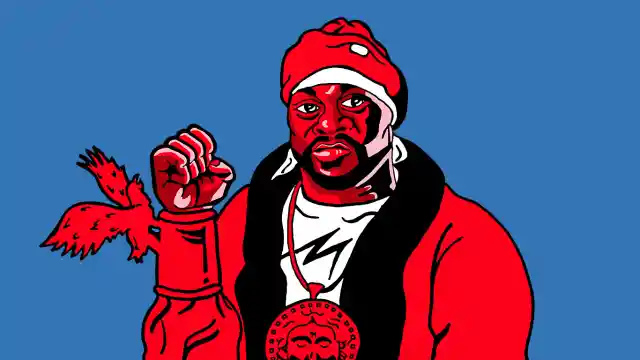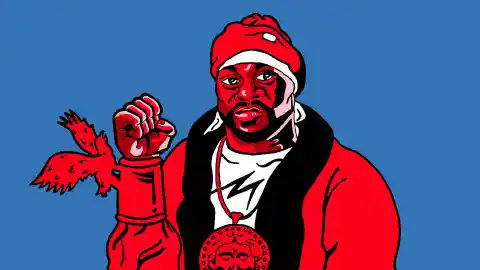

A few months ago, I wrote an article for this site where I listed my top five favorite rappers, and I received a bit of attention for my number one pick. While Ghostface Killah (real name Dennis Coles) has been a very respected figure in his two decades as a rap artist (particularly because he’s been the most consistent and unpredictable member of the Wu-Tang Clan), he’s rarely been referred to as “the greatest rapper ever” alongside artists like 2pac, The Notorious B.I.G., or Jay-Z.
While Ghostface certainly isn’t the most accessible rapper as his lyrics can verge on stream-of-consciousness, and his flow can be complex to follow, I feel that any listener who gives his discography a proper listen will be hard-pressed to find a more eclectic and vibrant emcee. That said, I’m now listing my picks for Ghostface’s top five records, while excluding his group and duo albums (otherwise, I would have definitely included Only Built 4 Cuban Linx… and Enter the Wu-Tang (36 Chambers) on this list).
Number Five: More Fish (2006). Released just eight months after Ghostface’s previous 2006 release Fishscale, this More Fish album could have been a gimmicky attempt to cash in on the critical acclaim and sales success of the previous record. Instead, More Fish proved to be a really enjoyable listen, that didn’t surpass Fishscale, but continued to verify that Ghost was continuing to go in an interesting new direction as a rapper. Partly an album for Ghostface’s group The Theodore Unit, the record has plenty of guest spots, which unfortunately hold it down as the best verses are always on Ghostface’s part. However, More Fish’s best tracks like “Blue Armor”, “Ghost is Back”, and “Grew Up Hard” showcase the hard-hitting beats and tough verbal-play that’s made Ghost so lovable for all these years.
Number Four: Apollo Kids (2010). Initially recorded as a mix-tape, Ghostface decided to call it an album, despite carrying a few no-no’s for a major label hip-hop release. Borrowing the title name from a Supreme Clientele track, lacking almost any promotion, and clocking in at a mere 40 minutes, the record sure sounds like a half-assed attempt on Ghost’s part to get some B-sides out to the public, but instead Apollo Kids is one of his best albums! Going back to his hardcore hip-hop roots after the strangely R+B tinged Ghostdini: Wizard of Poetry in Emerald City, this follow-up album is filled with great beats, and surprisingly great guest verses. Rappers like Black Thought, Redman, Busta Rhymes and even The Game all give quality rhymes on this record, and demonstrate that Ghost’s style can work even outside Wu-Tang canon.
Number Three: Ironman (1996). Ghostface’s first official solo album is probably the rapper’s most abrasive record, although ironically it was probably the most harmonious Wu-Tang release up to that point. While still containing the RZA’s trademark affinity for strings and moodiness, Ghostface’s own penchant for soul and Blaxploitation films gave it a unique place in the Wu-Tang canon. Admittedly, it is a bit too over-saturated with guest verses, because the best songs see Ghostface perform by himself, especially as he shows so many different faces to him throughout the 16 tracks. From the hilariously filthy sex rap “Wildflower”, to the genuinely heartfelt “All That I Got is You”, we see Ghost alternate from misogynist to lover without once contradicting his pathos. Nearly 20 years later, it’s still one of the Wu-Tang’s very best albums.
Number Two: Fishscale (2006). Nobody expected Ghostface to drop another classic album after two disappointing records (Bulletproof Wallets, and The Pretty Toney Album), but his fifth album turned out to be the masterpiece that rap music had been hoping for a small eternity to arrive. Championed by critics as an audacious turn away from “cellphone hip-hop”, Ghostface returned listeners to those gritty streets that permeated New York rap in the mid-90s. An epic feel, and sporting some of Ghostface’s most intriguing lyrics (“Who wanna battle the Don?/ I’m James Bond in the Octagon with two razors”), and Fishscale might still be the rappers most ambitious project to date. A prime example of how middle-aged rappers (Ghostface was 35 at the time of this album’s release) can be sublimely engrossing even for the under-25 set.
Number One: Supreme Clientele (2000). Ghostface Killah’s apex both lyrically, and production-wise, Supreme Clientele saw the emcee really step his game up. A sophomore album that sounded sonically much different than Ironman, but retained its flavor for grit and soul, Ghostface made his tightest record here. Carried by a healthy amount of guest spots, superb production/mixing qualities, and instant-classic tracks like “Cherchez La Ghost”, “One”, and “Wu Banga 101”, and you have a bonafide Wu masterpiece! Also, for historical value, it was also one of the first hip-hop records to have an open-diss towards 50 Cent on it.